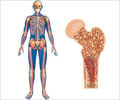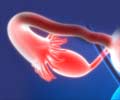Combination of two classes of drugs (CDK 12 inhibitors and PARP inhibitors) found to be highly effective in Ewing sarcoma, a childhood bone cancer.
- Combination of CDK 12 (cyclin dependent kinase 12) inhibitor and PARP (poly ADP ribose polymerase) inhibitor shown to be very effective in controlling Ewing Sarcoma
- Ewing sarcoma is the second most common bone cancer in children and young adults but unfortunately is not very responsive to conventional chemotherapy
Drug Screen Results For Ewing Sarcoma - The Initial Step
The field of pediatric oncology has long been challenged by the dearth of promising new drugs and in addition, Ewing sarcoma is not very responsive to conventional chemotherapy. These factors prompted the research team to do a wide ranging drug screen and found a possible link between CDK 12 inhibition and Ewing sarcoma.“Pediatric cancers often involve abnormalities in genes that encode for transcription factors, shape-shifting proteins that bind to DNA sequences to activate or repress gene expression," says Stegmaier, who co-directs the pediatric hematologic malignancy program at Dana-Farber/Boston Children's and is a member of the Broad Institute's Cancer Program. "Due to their disordered physical structure, transcription factors have largely eluded drug discovery efforts."
"CDK12 is known to be important for gene regulation, so we wondered why the EWS/FLI fusion protein might engender sensitivity to CDK12 inhibitors," Stegmaier says.
Testing the Role Of CDK 12 Inhibitors In Mice
- CDK12 inhibitors were found to greatly retard tumor growth and progression and prolong survival rates of mice models of Ewing sarcoma tumors.
12 inhibitors and ovarian cancer. According to earlier studies, ovarian tumors with CDK-12 protein inactivating gene mutation were found to be highly sensitive to FDA-approved drugs called PARP (poly ADP ribose polymerase) inhibitors, which block the activity of PARP proteins that play a role in DNA damage repair and other cellular processes in cancer cells.
Following this piece of scientific information, postdoctoral fellow Amanda Balboni Iniguez, PhD, who led the team hypothesized that inhibition of CDK12 in Ewing sarcoma could serve a double-whammy clinical benefit i.e. slowing down the growth of Ewing cells, as well as rendering them susceptible to killing by PARP inhibitors.
- Testing the combination of CDK 12 inhibitors and PARP inhibitors in mouse models of Ewing sarcoma and cultures of Ewing sarcoma tumor cells in dishes, the team was pleasantly surprised to note that there was a dramatic response and indeed some mice were even cured of the disease.
- The combination of CDK12 and PARP inhibitors showed no adverse effect on the bone marrow of the mice. This was in contrast to the earlier finding where PARP inhibitors were found to be associated with serious bone marrow toxicity when given with conventional chemotherapy
In conclusion, the findings of this study warrant further clinical trials to establish its safety and efficacy in humans.
"PARP inhibition is already FDA-approved for use in certain cancers, and inhibitors of CDK12 and other CDK proteins are in early-phase clinical testing," Stegmaier says. "If they are proven to be safe in adults, I hope we can extend testing to children with Ewing sarcoma."
Ewing sarcoma - Molecular Pathology Involved
- In Ewing sarcoma there is a defect (mutation) involving two genes resulting in an abnormal fusion transcription factor called EWS/FLI.
- The EWS/FLI transcription factor totally disrupts normal cell division by activating normally inactive regions of DNA, turning on genes that are supposed to be quiet, at the same time turning off genes that should be active, thus creating disorderly multiplication of cells leading to cancer.
References:
- The emerging roles of CDK12 in tumorigenesis - (https://celldiv.biomedcentral.com/articles/10.1186/s13008-017-0033-x)
- PARP inhibitors - (http://www.cancerresearchuk.org/about-cancer/cancer-in-general/treatment/targeted-cancer-drugs/types/PARP-inhibitors)
- CDK inhibitor - (https://en.wikipedia.org/wiki/CDK_inhibitor#Approved)














